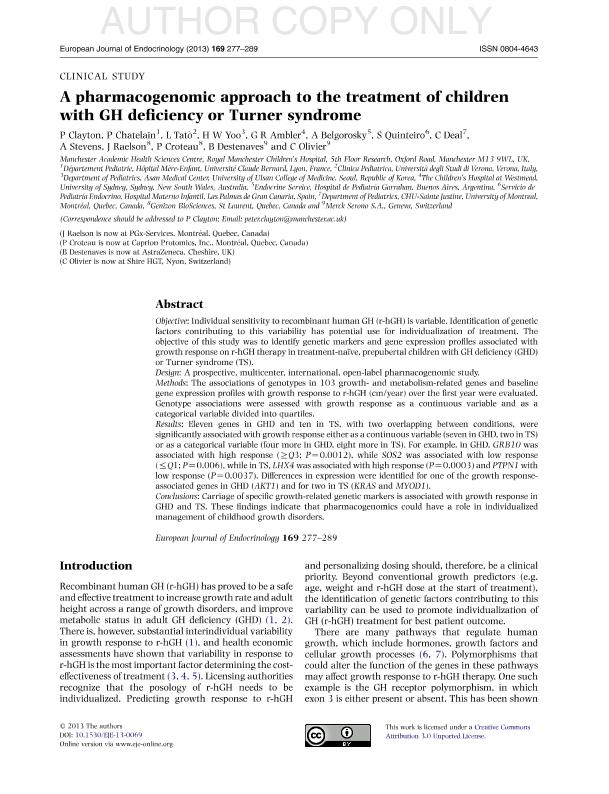Artículo
A pharmacogenomic approach to the treatment of children with GH deficiency or Turner syndrome
Clayton, P.; Chatelain, P.; Tato, L.; Yoo, H. W.; Ambler, G. R.; Belgorosky, Alicia ; Quinteiro, S.; Deal, C.; Stevens, A.; Raelson, J.; Croteau, P.; Destenaves, B.; Olivier, C.
; Quinteiro, S.; Deal, C.; Stevens, A.; Raelson, J.; Croteau, P.; Destenaves, B.; Olivier, C.
 ; Quinteiro, S.; Deal, C.; Stevens, A.; Raelson, J.; Croteau, P.; Destenaves, B.; Olivier, C.
; Quinteiro, S.; Deal, C.; Stevens, A.; Raelson, J.; Croteau, P.; Destenaves, B.; Olivier, C.
Fecha de publicación:
12/06/2013
Editorial:
Bioscientifica
Revista:
European Journal of Endocrinology
ISSN:
0804-4643
Idioma:
Inglés
Tipo de recurso:
Artículo publicado
Clasificación temática:
Resumen
Objective: Individual sensitivity to recombinant human GH (r-hGH) is variable. Identification of genetic factors contributing to this variability has potential use for individualization of treatment. The objective of this study was to identify genetic markers and gene expression profiles associated with growth response on r-hGH therapy in treatment-naïve, prepubertal children with GH deficiency (GHD) or Turner syndrome (TS).
Design: A prospective, multicenter, international, open-label pharmacogenomic study.
Methods: The associations of genotypes in 103 growth- and metabolism-related genes and baseline gene expression profiles with growth response to r-hGH (cm/year) over the first year were evaluated. Genotype associations were assessed with growth response as a continuous variable and as a categorical variable divided into quartiles.
Results: Eleven genes in GHD and ten in TS, with two overlapping between conditions, were significantly associated with growth response either as a continuous variable (seven in GHD, two in TS) or as a categorical variable (four more in GHD, eight more in TS). For example, in GHD, GRB10 was associated with high response (≥Q3; P=0.0012), while SOS2 was associated with low response (≤Q1; P=0.006), while in TS, LHX4 was associated with high response (P=0.0003) and PTPN1 with low response (P=0.0037). Differences in expression were identified for one of the growth response-associated genes in GHD (AKT1) and for two in TS (KRAS and MYOD1).
Conclusions: Carriage of specific growth-related genetic markers is associated with growth response in GHD and TS. These findings indicate that pharmacogenomics could have a role in individualized management of childhood growth disorders.
Palabras clave:
Ghr
,
Turner Syndrome
,
Gh Deficiency
,
Rhghsensitivity
Archivos asociados
Licencia
Identificadores
Colecciones
Articulos(SEDE CENTRAL)
Articulos de SEDE CENTRAL
Articulos de SEDE CENTRAL
Citación
Clayton, P.; Chatelain, P.; Tato, L.; Yoo, H. W.; Ambler, G. R.; et al.; A pharmacogenomic approach to the treatment of children with GH deficiency or Turner syndrome; Bioscientifica; European Journal of Endocrinology; 169; 12-6-2013; 277-289
Compartir
Altmétricas



